Mindfulness-based interventions for substance use disorders
- PMID: 34668188
- PMCID: PMC8527365
- DOI: 10.1002/14651858.CD011723.pub2
Mindfulness-based interventions for substance use disorders
Abstract
Background: Substance use disorders (SUDs) are highly prevalent and associated with a substantial public health burden. Although evidence-based interventions exist for treating SUDs, many individuals remain symptomatic despite treatment, and relapse is common.Mindfulness-based interventions (MBIs) have been examined for the treatment of SUDs, but available evidence is mixed.
Objectives: To determine the effects of MBIs for SUDs in terms of substance use outcomes, craving and adverse events compared to standard care, further psychotherapeutic, psychosocial or pharmacological interventions, or instructions, waiting list and no treatment.
Search methods: We searched the following databases up to April 2021: Cochrane Drugs and Alcohol Specialised Register, CENTRAL, PubMed, Embase, Web of Science, CINAHL and PsycINFO. We searched two trial registries and checked the reference lists of included studies for relevant randomized controlled trials (RCTs).
Selection criteria: RCTs testing a MBI versus no treatment or another treatment in individuals with SUDs. SUDs included alcohol and/or drug use disorders but excluded tobacco use disorders. MBIs were defined as interventions including training in mindfulness meditation with repeated meditation practice. Studies in which SUDs were formally diagnosed as well as those merely demonstrating elevated SUD risk were eligible.
Data collection and analysis: We used standard methodological procedures expected by Cochrane.
Main results: Forty RCTs met our inclusion criteria, with 35 RCTs involving 2825 participants eligible for meta-analysis. All studies were at high risk of performance bias and most were at high risk of detection bias. Mindfulness-based interventions (MBIs) versus no treatment Twenty-four RCTs included a comparison between MBI and no treatment. The evidence was uncertain about the effects of MBIs relative to no treatment on all primary outcomes: continuous abstinence rate (post: risk ratio (RR) = 0.96, 95% CI 0.44 to 2.14, 1 RCT, 112 participants; follow-up: RR = 1.04, 95% CI 0.54 to 2.01, 1 RCT, 112 participants); percentage of days with substance use (post-treatment: standardized mean difference (SMD) = 0.05, 95% CI -0.37 to 0.47, 4 RCTs, 248 participants; follow-up: SMD = 0.21, 95% CI -0.12 to 0.54, 3 RCTs, 167 participants); and consumed amount (post-treatment: SMD = 0.10, 95% CI -0.31 to 0.52, 3 RCTs, 221 participants; follow-up: SMD = 0.33, 95% CI 0.00 to 0.66, 2 RCTs, 142 participants). Evidence was uncertain for craving intensity and serious adverse events. Analysis of treatment acceptability indicated MBIs result in little to no increase in study attrition relative to no treatment (RR = 1.04, 95% CI 0.77 to 1.40, 21 RCTs, 1087 participants). Certainty of evidence for all other outcomes was very low due to imprecision, risk of bias, and/or inconsistency. Data were unavailable to evaluate adverse events. Mindfulness-based interventions (MBIs) versus other treatments (standard of care, cognitive behavioral therapy, psychoeducation, support group, physical exercise, medication) Nineteen RCTs included a comparison between MBI and another treatment. The evidence was very uncertain about the effects of MBIs relative to other treatments on continuous abstinence rate at post-treatment (RR = 0.80, 95% CI 0.45 to 1.44, 1 RCT, 286 participants) and follow-up (RR = 0.57, 95% CI 0.28 to 1.16, 1 RCT, 286 participants), and on consumed amount at post-treatment (SMD = -0.42, 95% CI -1.23 to 0.39, 1 RCT, 25 participants) due to imprecision and risk of bias. The evidence suggests that MBIs reduce percentage of days with substance use slightly relative to other treatments at post-treatment (SMD = -0.21, 95% CI -0.45 to 0.03, 5 RCTs, 523 participants) and follow-up (SMD = -0.39, 95% CI -0.96 to 0.17, 3 RCTs, 409 participants). The evidence was very uncertain about the effects of MBIs relative to other treatments on craving intensity due to imprecision and inconsistency. Analysis of treatment acceptability indicated MBIs result in little to no increase in attrition relative to other treatments (RR = 1.06, 95% CI 0.89 to 1.26, 14 RCTs, 1531 participants). Data were unavailable to evaluate adverse events.
Authors' conclusions: In comparison with no treatment, the evidence is uncertain regarding the impact of MBIs on SUD-related outcomes. MBIs result in little to no higher attrition than no treatment. In comparison with other treatments, MBIs may slightly reduce days with substance use at post-treatment and follow-up (4 to 10 months). The evidence is uncertain regarding the impact of MBIs relative to other treatments on abstinence, consumed substance amount, or craving. MBIs result in little to no higher attrition than other treatments. Few studies reported adverse events.
Copyright © 2021 The Cochrane Collaboration. Published by John Wiley & Sons, Ltd.
Conflict of interest statement
SIMON B. GOLDBERG: No conflict of interest known
BRIAN T. PACE: No conflict of interest known
MATAS GRISKAITIS: No conflict of interest known
REINHARD WILLUTZKI: No conflict of interest known
NICOLE SKOETZ: No conflict of interest known
SVEN THOENES: (deceased, October 2020). No conflict of interest known. This declaration of interest was provided before the author died.
ALEKSANDRA ZGIERSKA: Dr. Zgierska is a member of the Board of Directors for the American Society of Addiction Medicine.
SUSANNE RÖSNER: No conflict of interest known
Figures
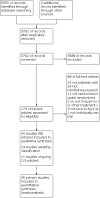
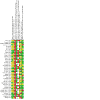
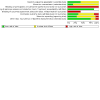
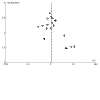
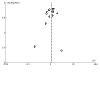





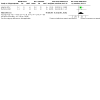

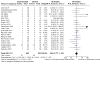
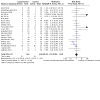


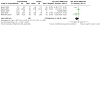
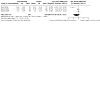

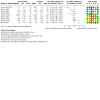
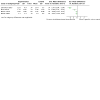
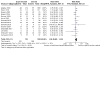
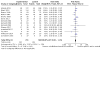
Update of
References
References to studies included in this review
Abed 2019 {published data only}
-
- Abed M, Ansari Shahidi M. Mindfulness-based relapse prevention to reduce lapse and craving. Journal of Substance Use 2019;24(6):638-42. [DOI: 10.1080/14659891.2019.1640305] - DOI
Alegria 2019 {published data only}
-
- Alegria M, Falgas-Bague I, Collazos F, Camacho RC, Markle SL, Wang Y, et al. Evaluation of the integrated intervention for dual problems and early action among latino immigrants with co-occurring mental health and substance misuse symptoms: a randomized clinical trial. JAMA Network Open 2019;2(1):1-15. - PMC - PubMed
-
- Fortuna LR, Falgas-Bague I, Ramos Z, Porche MV, Alegria M. Development of a cognitive behavioral therapy with integrated mindfulness for latinx immigrants with co-occurring disorders: analysis of intermediary outcomes. Psychological Trauma: Theory, Research, Practice, and Policy 2020;12(8):825-35. - PMC - PubMed
Alizadehgoradel 2019 {published data only}
-
- Alizadehgoradel J, Imani S, Nejati V, Fathabadi J. Mindfulness-based substance abuse treatment (MBSAT) improves executive functions in adolescents with substance use disorders. Neurology Psychiatry and Brain Research 2019;34:13-21. [DOI: ]
Alterman 2004 {published data only}
-
- Alterman AI, Koppenhaver JM, Mulholland E, Ladden LJ, Baime MJ. Pilot trial of effectiveness of mindfulness meditation for substance abuse patients. Journal of Substance Use 2004;9(6):259-68. [DOI: ]
Asl 2014a {published data only}
Asl 2014b {published and unpublished data}
Bein 2015 {published data only}
-
- Bein Z. A pilot study of an 8-week mindfulness-based intervention for veterans with posttraumatic symptoms and co-occurring substance use disorders. Dissertation Abstracts International: Section B: The Sciences and Engineering 2015;75(10-B(E)).
Bevan 2012 {published and unpublished data}
-
- Bevan E. The effect of mindfulness training on drug craving is moderated by level of negative affect. Dissertation Abstracts International: Section B: The Sciences and Engineering 2012;72(7-B):4312.
Black 2019 {published data only}
-
- NCT02977988. Women's treatment and early recovery. https://clinicaltrials.gov/show/NCT02977988 2016.
Bowen 2009 {published data only}
Bowen 2014 {published data only (unpublished sought but not used)}
-
- Bowen S, Witkiewitz K, Clifasefi SL, Grow J, Chawla N, Hsu SH, et al. Relative efficacy of mindfulness-based relapse prevention, standard relapse prevention, and treatment as usual for substance use disorders: a randomized clinical trial. JAMA psychiatry 2014;71(5):547-56. [DOI: 10.1001/jamapsychiatry.2013.4546] - DOI - PMC - PubMed
-
- Dingle T, Bowen S. Evaluating substance use treatment efficacy for younger and older adults. Addictive Behaviors 2021;112(106618):1-4. - PubMed
Brewer 2009 {published data only}
Brown 2017 {published data only}
-
- Brown SM, Bender KA, Bellamy JL, Garland EL, Dmitrieva J, Jenson JM. A pilot randomized trial of a mindfulness-informed intervention for child welfare-involved families. Mindfulness 2021;12:420-35.
-
- Brown SM. A mindfulness-based intervention to improve family functioning among child welfare-involved families with substance use. Dissertation Abstracts International Section A: Humanities and Social Sciences 2017;77(11-A(E)):1-21.
Davis 2013 {published data only}
Davis 2018 {published data only (unpublished sought but not used)}
-
- Davis JP, Berry D, Dumas TM, Ritter E, Smith DC, Menard C, et al. Substance use outcomes for mindfulness based relapse prevention are partially mediated by reductions in stress: results from a randomized trial. Journal of Substance Abuse Treatment 2018;91:37-48. [DOI: 10.1016/j.jsat.2018.05.002] - DOI - PubMed
-
- Davis JP. Effect of mindfulness based relapse prevention on developmental trends, stress, and substance use among young adults in residential substance use treatment: a randomized controlled trial. Dissertation Abstracts International Section A: Humanities and Social Sciences 2019;80(5-A(E)):1-229.
de Dios 2012 {published and unpublished data}
Esmaeili 2017 {published data only (unpublished sought but not used)}
-
- Esmaeili A, Khodadadi M, Norozi E, Miri MR. Effectiveness of mindfulness-based cognitive group therapy on cognitive emotion regulation of patients under treatment with methadone. Journal of Substance Use 2017;23(1):58-62. [DOI: 10.1080/14659891.2017.1348553] - DOI
Foroushani 2019 {published data only (unpublished sought but not used)}
-
- Foroushani NS. The impact of mindfulness-based relapse prevention on craving, lapse and mindfulness fostering in addicted patients in methadone maintenance treatment. Heroin Addiction and Related Clinical Problems 2019;21(5):33-40.
Garland 2010 {published data only}
-
- Garland EL, Gaylord SA, Boettiger CA, Howard MO. Mindfulness training modifies cognitive, affective, and physiological mechanisms implicated in alcohol dependence: results of a randomized controlled pilot trial. Journal of Psychoactive Drugs 2010;42(2 XOID - PSYCINFO):177-92. [DOI: 10.1080/02791072.2010.10400690] - DOI - PMC - PubMed
-
- Garland EL. Biopsychosocial assessment of a mindfulness-oriented cognitive intervention for alcohol dependent adults. Dissertation Abstracts International Section A: Humanities and Social Sciences 2010;71(1-A):333.
Garland 2016 {published data only (unpublished sought but not used)}
-
- Garland EL, Roberts-Lewis A, Tronnier CD, Graves R, Kelley K. Corrigendum to "Mindfulness-oriented recovery enhancement versus CBT for co-occurring substance dependence, traumatic stress, and psychiatric disorders: Proximal outcomes from a pragmatic randomized trial" (Behav. Res. Ther. vol 77, pg 7, 2016). Behaviour Research and Therapy 2018;100:78. [DOI: 10.1016/j.brat.2017.09.007] - DOI - PMC - PubMed
-
- Garland EL, Roberts-Lewis A, Tronnier CD, Graves R, Kelley K. Mindfulness-Oriented Recovery Enhancement versus CBT for co-occurring substance dependence, traumatic stress, and psychiatric disorders: Proximal outcomes from a pragmatic randomized trial. Behaviour research and therapy 2016;77:7-16. [DOI: 10.1016/j.brat.2015.11.012] - DOI - PMC - PubMed
Garland 2019 {published data only}
-
- Garland EL, Hanley AW, Kline A, Cooperman NA. Mindfulness-Oriented Recovery Enhancement reduces opioid craving among individuals with opioid use disorder and chronic pain in medication assisted treatment: ecological momentary assessments from a stage 1 randomized controlled trial. Drug and Alcohol Dependence 2019;203:61‐5. [DOI: 10.1016/j.drugalcdep.2019.07.007] - DOI - PMC - PubMed
Glasner 2017 {published data only}
-
- Glasner-Edwards S, Mooney L, Ang A, Garneau HC, Hartwell EE, Brecht ML, et al. Mindfulness based relapse prevention improves stimulant use among adults with major depression and generalized anxiety disorder. Drug and Alcohol Dependence 2015;156:e80. [DOI: ]
Himelstein 2015 {published data only (unpublished sought but not used)}
-
- Himelstein S, Saul S, Garcia-Romeu A. Does mindfulness meditation increase effectiveness of substance abuse treatment with incarcerated youth? A pilot randomized controlled trial. Mindfulness 2015;6(6):1472-80. [DOI: 10.1007/s12671-015-0431-6] - DOI
Imani 2015 {published data only}
-
- Imani S, Vahid MK, Gharraee B, Habibi M, Bowen, S, Noroozi A. Comparing mindfulness-based group therapy with treatment as usual for opioid dependents: a pilot randomized clinical trial study protocol. Iranian Journal of Psychiatry and Behavioral Sciences 2015;9(1):1-4. [DOI: 10.5812/ijpbs.216] - DOI - PMC - PubMed
Jenaabadi 2017 {published data only}
-
- Jenaabadi H, Jahangir AH. Comparing the effectiveness of mindfulness-based group therapy and methadone maintenance therapy on psychological symptoms (obsession, interpersonal sensitivity, depression, anxiety, and aggression) among opioid-dependent patients. Shiraz E Medical Journal 2017;18(6):e45224. [DOI: ]
Lee 2011 {published and unpublished data}
-
- Lee KH, Bowen S, An-Fu B. Psychosocial outcomes of mindfulness-based relapse prevention in incarcerated substance abusers in Taiwan: a preliminary study. Journal of Substance Use 2011;16(6):476-83. [DOI: 10.3109/14659891.2010.505999] - DOI
Machado 2020 {published data only}
Marfurt 2007 {published data only}
-
- Marfurt S. Reducing stress in women recovering from substance abuse. Dissertation Abstracts International: Section B: The Sciences and Engineering 2007;68(1-B):209.
Margolin 2006 {published data only}
-
- Margolin A, Beitel M, Schuman-Olivier Z, Avants SK. A controlled study of a spirituality-focused intervention for increasing motivation for HIV prevention among drug users. AIDS Education and Prevention : official publication of the International Society for AIDS Education 2006;18(4):311-22. [DOI: 10.1521/aeap.2006.18.4.311] - DOI - PubMed
Mermelstein 2015 {published data only}
-
- Mermelstein LC. A brief mindfulness intervention to decrease binge drinking among college students: a controlled study. Dissertation Abstracts International: Section B: The Sciences and Engineering 2015;76(5-B(E)):1-157.
Ramezani 2019 {published data only}
-
- Ramezani S, Afkhamzadeh AR, Qorbani H, Naimi S, Rahmani S. Effect of mindfulness-based cognitive therapy on substance dependence intensity and cognitive emotion regulation in patients under methadone maintenance treatment. Journal of Practice in Clinical Psychology 2019;7(3):225-34.
Shorey 2017 {published data only}
Vowles 2020 {published data only}
-
- Pilot study of combined treatment for veterans with chronic pain & opiate misuse. https://clinicaltrials.gov/show/NCT02423772.
Witkiewitz 2014 {published data only}
-
- Witkiewitz K, Warner K, Sully B, Barricks A, Stauffer C, Thompson BL, et al. Randomized trial comparing mindfulness-based relapse prevention with relapse prevention for women offenders at a residential addiction treatment center. Substance Use & Misuse 2014;49(5):536-46. [DOI: 10.3109/10826084.2013.856922] - DOI - PubMed
Wongtongkam 2018 {published data only (unpublished sought but not used)}
-
- Wongtongkam N, Lampoo S, Choocherd P, Chiangkuntod S. Partial efficacy of vipassana mindfulness approach in alcohol-dependent persons. Alcoholism Treatment Quarterly 2018;36(1):3-14. [DOI: ]
Wongtongkam 2019 {published data only}
-
- Wongtongkam N, Bhavanaveeranusith P. A pilot study of Vipassana meditation with female drug users at a rehabilitation centre, Thailand. Therapeutic Communities 2019;40(3/4):132-41.
Yaghubi 2017 {published data only}
-
- Yaghubi M. Effect of mindfulness based relapse prevention model on impulsivity, distress tolerance and relapse prevention in opioid dependent patient. http://www.who.int/trialsearch/Trial2.aspx?TrialID=IRCT2016010525870N1 2016.
Zemestani 2016 {published data only}
-
- Zemestani M, Ottaviani C. Effectiveness of mindfulness-based relapse prevention for co-occurring substance use and depression disorders. Mindfulness 2016;7(6):1347-55. [DOI: 10.1007/s12671-016-0576-y] - DOI
Zgierska 2017 {published data only}
-
- NCT01056484. Mindfulness Meditation for Health. https://clinicaltrials.gov/show/NCT01056484 2010.
-
- Zgierska A, Rabago D, Lerner F, Goodman V, Coe C. Biological effects of mindfulness-based relapse prevention in alcohol dependence: pilot clinical trial. Journal of Investigative Medicine 2010;58(4):651. [DOI: 10.231/JIM.0b013e3181d85541] - DOI
-
- Zgierska AE, Shapiro J, Burzinski CA, Lerner F, Goodman-Strenski V. Maintaining treatment fidelity of mindfulness-based relapse prevention intervention for alcohol dependence: a randomized controlled trial experience. Evidence-Based Complementary and Alternative Medicine 2017;2017:1-12. [DOI: 10.1155/2017/9716586] - DOI - PMC - PubMed
Zhang 2019 {published data only}
-
- Zhang JT, Zhang JY, Du ZY, Li J, Lu CH, Du J. Effect of mindfulness-based intervention on functional connectivity of resting state electroencephalogram of amphetamine-type stimulants use patients. Journal of Shanghai Jiao Tong University 2019;39(12):1416-21.
References to studies excluded from this review
Alexander 2019 {published data only}
-
- Alexander K, Kronk R, Sekula K, Short V, Abatemarco D. Implementation of a mindfulness intervention for women in treatment for opioid use disorder and its effects on depression symptoms. Issues in Mental Health Nursing 2019;40:690-6. [DOI: ] - PubMed
Amaro 2017 {published data only}
-
- Amaro H, Black DS. Moment-by-Moment in Women's Recovery: Randomized controlled trial protocol to test the efficacy of a mindfulness-based intervention on treatment retention and relapse prevention among women in residential treatment for substance use disorder. Contemporary Clinical Trials 2017;62:146-52. [DOI: 10.1016/j.cct.2017.09.004] - DOI - PMC - PubMed
Bandawar 2016 {published data only}
-
- Bandawar MS, Field M. Effects of inhibition training and a brief mindfulness intervention on event-related potential markers of inhibitory control in heavy drinkers. Alcoholism: Cclinical and Experimental Research. Conference: 39th annual scientific meeting of the research society on alcoholism. New orleans, LA united states. Conference start: 20160625. Conference end: 20160629. Conference publication: (var.pagings) 2016;40:212a. [DOI: 10.1111/acer.13084] - DOI
Bowen 2006 {published data only}
-
- Bowen S, Witkiewitz K, Dillworth TM, Chawla N, Simpson TL, Ostafin BD, et al. Mindfulness meditation and substance use in an incarcerated population. Psychology of Addictive Behaviors 2006;20(3):343-7. [DOI: ] - PubMed
Bowen 2012 {published data only}
Bowen 2017 {published data only}
Carpentier 2015 {published data only}
Caselli 2016 {published data only}
Chen 2019 {published data only}
-
- Chen JY, Yu JC, Cao JP, Xiao Y, Gu H, Zhong RL, et al. Abstinence following a motivation-skill-desensitization-mental energy intervention for heroin dependence: a three-year follow-up result of a randomized controlled trial. Current Medical Science 2019;39(3):472-82. [DOI: 10.1007/s11596-019-2062-y] - DOI - PubMed
Chouhan 2011 {published data only}
-
- Chouhan S, Kumar S. Comparative study between effectiveness of dance movement therapy and progressive relaxation therapy with music for stress management in college students. Indian Journal of Physiotherapy & Occupational Therapy 2011;5(2):172-5.
Collins 2009 {published data only}
Crescentini 2015 {published data only}
Crowfoot 2014 {published data only}
-
- Crowfoot K. The effects of meditation on the perceived stress of participants in an outpatient substance abuse program. Dissertation Abstracts International: Section B: The Sciences and Engineering 2014;74(11-B(E)):Not-specified.
DRKS00015678 {published data only}
-
- DRKS00015678. Substance use prevention in adolescence by the mindfulness-augmented Strengthening Families Program 10-14 („SFP-Mind“). http://www.who.int/trialsearch/Trial2.aspx?TrialID=DRKS00015678 2019.
Enkema 2017 {published data only}
Fonagy 2010 {published data only}
-
- Fonagy P. The changing shape of clinical practice: driven by science or by pragmatics? Psychoanalytic Psychotherapy 2010;24(1):22-43. [DOI: 10.1080/02668731003590139] - DOI
Garland 2014 {published data only}
Garland 2014a {published data only}
-
- Garland EL, Manusov EG, Froeliger B, Kelly A, Williams JM, Howard MO. Mindfulness-oriented recovery enhancement for chronic pain and prescription opioid misuse: results from an early-stage randomized controlled trial. Journal of Consulting and Clinical Psychology: 2014;82(3):448-59. [DOI: 10.1037/a0035798] - DOI - PMC - PubMed
Garland 2014b {published data only}
Garland 2017 {published data only}
-
- Garland EL, Howard MO, Zubieta JK, Froeliger B. Restructuring hedonic dysregulation in chronic pain and prescription opioid misuse: effects of mindfulness-oriented recovery enhancement on responsiveness to drug cues and natural rewards. Psychotherapy and Psychosomatics 2017;86(2):111-2. [DOI: ] - PMC - PubMed
Garland 2017a {published data only}
-
- Garland EL, Bryan CJ, Finan PH Thomas EA Priddy SE, Riquino MR, et al. Pain, hedonic regulation, and opioid misuse: modulation of momentary experience by mindfulness-oriented recovery enhancement in opioid-treated chronic pain patients. Drug and Alcohol Dependence 2017;173 Suppl 1:65-72. [DOI: 10.1016/j.drugalcdep.2016.07.033] - DOI - PubMed
Garland 2017b {published data only}
-
- Garland EL, Baker AK, Howard MO. Mindfulness- oriented recovery enhancement reduces opioid attentional bias among prescription opioid-treated chronic pain patients. Journal of the Society for Social Work and Research 2017;8(4):493-509. [DOI: 10.1086/694324] - DOI
Garland 2018 {published data only}
Garland 2019a {published data only}
-
- Garland EL, Bryan MA, Priddy SE, Riquino MR, Froeliger B, Howard MO. Effects of mindfulness-oriented recovery enhancement versus social support on negative affective interference during inhibitory control among opioid-treated chronic pain patients: a pilot mechanistic study. Annals of behavioral medicine 2019;53(10):865‐76. [DOI: 10.1093/abm/kay096] - DOI - PMC - PubMed
Garland 2019b {published data only}
-
- Garland EL, Hanley AW, Riquino MR, Reese SE, Baker AK, Salas K, et al. Mindfulness-oriented recovery enhancement reduces opioid misuse risk via analgesic and positive psychological mechanisms: a randomized controlled trial. Journal of Consulting and Clinical Psychology 2019;87(10):927-40. [DOI: ] - PMC - PubMed
Garland 2019c {published data only}
Garland 2020 {published data only}
Gayner 2012 {published data only}
-
- Gayner B, Esplen M, DeRoche P, Wong J, Bishop S, Kavanagh L, et al. A randomized controlled trial of mindfulness-based stress reduction to manage affective symptoms and improve quality of life in gay men living with HIV. Journal of Behavioral Medicine 2012;35(3):272-85. [DOI: 10.1007/s10865-011-9350-8] - DOI - PubMed
Gibson 2019 {published data only}
Grow 2015 {published data only}
Hai 2021 {published data only}
-
- Hai H, Wigmore B, Franklin C, Shorkey C, Sternberg K, Cole AH, et al. Efficacy of two-way prayer meditation in improving the psychospiritual well-being of people with substance use disorders: a pilot randomized controlled trial. Substance Abuse 2021;in press:Epub ahead of print. - PubMed
Hargreaves 1974 {published data only}
-
- Hargreaves WA, Showstack J, Flohr R, Brady C, Harri S. Treatment acceptance following intake assignment to individual therapy, group therapy, or contact group. Archives of General Psychiatry 1974;31(3):343-9. - PubMed
Hruschak 2021 {published data only}
-
- Hruschak V, Rosen D, Tierney M, Eack SM, Wasan AD, Cochran G. Integrated Psychosocial Group Treatment: a randomized pilot trial of a harm reduction and preventive approach for patients with chronic pain at risk of opioid misuse. Pain Medicine 2021;22(9):2007-18. - PubMed
Iranshahri 2015 {published data only}
-
- Iranshahri B, Jenaabadi H. The effectiveness of mindfulness therapy in controlling under treatment addicts’ drug cravings. Open Journal of Medical Psychology 2015;04(03):88-98. [DOI: 10.4236/ojmp.2015.43009] - DOI
IRCT20150413021727N2 {published data only}
-
- IRCT20150413021727N2. The effect of mindfulness-based group therapy in relapse prevention of methamphetamine-addicted males. http://www.who.int/trialsearch/Trial2.aspx?TrialID=IRCT20150413021727N2 2017.
IRCT2015042420961N {published data only}
-
- IRCT2015042420961N. The effect of wells’ metacognitive therapy on dysfunctional thoughts in addicts with drug abuse. http://www.who.int/trialsearch/Trial2.aspx?TrialID=IRCT2015042420961N3 2015.
Kamboj 2017 {published data only}
-
- Kamboj SK, Irez D, Serfaty S, Thomas E, Das RK, Freeman TP. Ultra- brief mindfulness training reduces alcohol consumption in at-risk drinkers: a randomized double-blind active-controlled experiment. International Journal of Neuropsychopharmacology 2017;20(11):936-47. [DOI: 10.1093/ijnp/pyx064] - DOI - PMC - PubMed
Lee 2017 {published data only}
Lyons 2019 {published data only}
Magidson 2011 {published data only}
-
- Magidson JF, Gorka SM, MacPherson L, Hopko DR, Blanco C, Lejuez CW, et al. Examining the effect of the Life Enhancement Treatment for Substance Use (LETS ACT) on residential substance abuse treatment retention. Addictive Behaviors 2011;36(6):615-23. [DOI: 10.1016/j.addbeh.2011.01.016] - DOI - PMC - PubMed
Malouf 2017 {published data only}
Marcus 2001 {published data only}
-
- Marcus MT, Fine M, Kouzekanani K. Mindfulness-based meditation in a therapeutic community. Journal of Substance Use 2001;5(4):305-11.
Marcus 2009 {published data only}
Murphy 2014 {published data only}
Nakamura 2015 {published data only}
-
- Nakamura Y, Lipschitz DL, Kanarowski E, McCormick T, Sutherland D, Melow-Murchie M. Investigating Impacts of Incorporating an adjuvant mind-body intervention method into treatment as usual at a community-based substance abuse treatment facility: a pilot randomized controlled study. Sage Open 2015;5(1):1-18. [DOI: 10.1177/2158244015572489] - DOI
NCT01505101 {published data only}
-
- NCT01505101. Mindfulness- oriented recovery enhancement for chronic pain patients receiving opioid therapy. https://clinicaltrials.gov/show/NCT01505101 2012.
NCT04082637 {published data only}
-
- NCT04082637. Mindful body awareness with buprenorphine for opioid use disorder treatment. https://clinicaltrials.gov/show/NCT04082637 2019.
NCT04160754 {published data only}
-
- Mindfulness for at risk youth: understanding substance use and important mechanisms of change. https://clinicaltrials.gov/show/NCT04160754.
NCT04567043 {published data only}
-
- Treating opioid misuse via mindfulness-based just-in-time adaptive intervention. https://clinicaltrials.gov/show/NCT04567043.
NCT04769986 {published data only}
-
- Mobile mindfulness for alcohol use and PTSD among veterans. https://clinicaltrials.gov/show/NCT04769986.
Nice 2008 {published data only}
-
- Nice PR. Mindfulness interventions in the treatment of substance and mood disorders. Dissertation Abstracts International: Section B: The Sciences and Engineering 2008;69(3-B):1982.
Ojehagen 1992 {published data only}
-
- Ojehagen A, Berglund M. Acceptance, attrition, and outcome in an outpatient treatment programme for alcoholics. A comparison between a randomized and a non-randomized process-outcome study. European Archives of Psychiatry and Clinical Neuroscience 1992;242(2-3):82-4. - PubMed
Parker 1978 {published data only}
-
- Parker JC, Gilbert GS, Thoreson RW. Anxiety management in alcoholics: a study of generalized effects of relaxation techniques. Addictive Behaviors 1978;3(2):123-7. - PubMed
Parker 1978a {published data only}
-
- Parker JC, Gilbert GS, Thoreson RW. Reduction of autonomic arousal in alcoholics: a comparison of relaxation and meditation techniques. Journal of Consulting and Clinical Psychology 1978;46(5):879-86. [DOI: ] - PubMed
Price 2012 {published data only}
Price 2012a {published data only}
Price 2016 {published data only}
-
- Price C, Crowell S. Interoceptive awareness training for emotion regulation through mindful body awareness for women in treatment for substance use disorder. Journal of Alternative and Complementary Medicine 2016;22(6):A19. [DOI: ]
Price 2017 {published data only}
-
- Price C, Crowell SE, Cheng C, Thompson E. Interoceptive awareness training for women in SUD treatment. Drug and Alcohol Dependence. Conference: 2016 annual meeting of the college on problems of drug dependence, CPDD 2016. United states 2017;171:e169. [DOI: 10.1016/j.drugalcdep.2016.08.464] - DOI
Price 2018 {published data only}
Price 2019 {published data only}
-
- Price CJ, Thompson EA, Crowell S, Pike K. Longitudinal effects of interoceptive awareness training through mindful awareness in body-oriented therapy (MABT) as an adjunct to women's substance use disorder treatment: a randomized controlled trial. Drug and Alcohol Dependence 2019;198:140-9. [DOI: ] - PMC - PubMed
Price 2019a {published data only}
Rentala 2020 {published data only}
-
- Rentala S, Ng S, Chan CLW, Bevoor P, Nayak RB, Desai M. Effect of holistic relapse prevention intervention among individuals with alcohol dependence: a prospective study at a mental health care setting in India. Journal of Ethnicity in Substance Abuse 2020;in press:Epub ahead of print. - PubMed
Russell 2019 {published data only}
-
- Russell BS, Hutchison M, Fusco A. Emotion regulation outcomes and preliminary feasibility evidence from a mindfulness intervention for adolescent substance use. Journal of Child & Adolescent Substance Abuse 2019;28:21-31. [DOI: ]
Simpson 2015 {published data only}
-
- Simpson TL, Stappenbeck CA, Luterek JA, Rosenthal CF, Gurrad B, Kaysen D. Outcomes of an rct comparingtwo copingskills among dually diagnosed individuals with alcohol dependence and PTSD. Alcoholism: Clinical and Experimental Research. 2015;39:299a. [DOI: 10.1111/acer.12742] - DOI
Tang 2016 {published data only}
Temme 2012 {published data only}
-
- Temme LJ, Fenster J, Ream GL. Evaluation of meditation in the treatment of chemical dependency. Journal of Social Work Practice in the Addictions 2012;12(3):264-81. [DOI: 10.1080/1533256X.2012.702632] - DOI
Vinci 2014 {published data only}
Wupperman 2015 {published data only}
References to studies awaiting assessment
ACTRN12613000193774 {published data only}
-
- ACTRN12613000193774. The effects of Mindfulness training people recovering from alcohol dependence. http://www.who.int/trialsearch/Trial2.aspx?TrialID=ACTRN12613000193774 2013.
Baldus 2018 {published data only}
-
- Baldus C, Mokros L, Daubmann A, Arnaud N, Holtmann M, Thomasius R, et al. Treatment effectiveness of a mindfulness-based inpatient group psychotherapy in adolescent substance use disorder - study protocol for a randomized controlled trial. Trials 2018;19(1):706. [DOI: 10.1186/s13063-018-3048-y] - DOI - PMC - PubMed
Becker 2017 {published data only}
c9njc, R. B. R. {published data only}
-
- Effects of mindfulness on impulsivity of peope with alcohol use disorder. http://www.who.int/trialsearch/Trial2.aspx?TrialID=RBR-6c9njc.
CasasGaviln 2018 {published data only}
-
- Casas Gavilán E, Peña Lorente T. Eficacia del programa de prevención de recaídas basado en mindfulness para la disminución del craving del paciente alcohólico. Nure Investigación 2018;15(93):1-10.
Chen 2018 {published data only}
-
- Chen XJ, Wang DM, Zhou LD, Winkler M, Pauli P, Sui N, et al. Mindfulness-based relapse prevention combined with virtual reality cue exposure for methamphetamine use disorder: study protocol for a randomized controlled trial. Contemporary Clinical Trials 2018;70:99‐105. [DOI: 10.1016/j.cct.2018.04.006] - DOI - PubMed
Connors 2011 {published data only}
-
- Connors GJ, Walitzer KS, Smyth NS, Reschke JE. Changes in stress and drinking following MBSR training in alcoholism treatment. Alcohol 2011;45(3):301.
CTRI/2018/07/014994 {published data only}
-
- CTRI/2018/07/014994. Holistic relapse prevention for alcoholic patients. http://www.who.int/trialsearch/Trial2.aspx?TrialID=CTRI/2018/07/014994 2018.
Garland 2016a {published data only}
-
- Garland E. Mindfulness promotes positive emotion-cognition interactions integral to human flourishing: evidence from research on mindfulness-oriented recovery enhancement. Psychosomatic Medicine 2016;78(3):A9. [DOI: 10.1097/PSY.0000000000000343] - DOI
IRCT2013031612826N1 {published data only}
-
- Irct2013031612826N. Effectiveness of mindfulness based group therapy reduction of risk factors for relapse in opioid addicted. http://www.who.int/trialsearch/Trial2.aspx?TrialID=IRCT2013031612826N1 2013.
IRCT2015041321727N1 {published data only}
-
- IRCT2015041321727N1. The effectiveness of group therapy based on detached mindfulness (DM) techniques in decreasing the tendency and the probability using in drug dependents under methadone maintenance treatment. http://www.who.int/trialsearch/Trial2.aspx?TrialID=IRCT2015041321727N1 2015.
IRCT2015061522749N1 {published data only}
-
- IRCT2015061522749N1. The effectiveness of mindfulness on addiction. http://www.who.int/trialsearch/Trial2.aspx?TrialID=IRCT2015061522749N1 2015.
IRCT2015121925603N1 {published data only}
-
- IRCT2015121925603N. The effectiveness of mindfulness therapy on the methamphetamine addicts. http://www.who.int/trialsearch/Trial2.aspx?TrialID=IRCT2015121925603N1 2016.
Irct20170702034844N {published data only}
-
- Effectiveness of mindfulness-based relapse prevention group therapy among people with opioids use disorder. http://www.who.int/trialsearch/Trial2.aspx?TrialID=IRCT20170702034844N5.
IRCT2017081325160N7 {published data only}
-
- IRCT2017081325160N7. The Efficacy of mindfulness-based cognitive therapy on reduction of psychological symptoms,craving beliefs and increase self-efficacy in opioid abusers. http://www.who.int/trialsearch/Trial2.aspx?TrialID=IRCT2017081325160N7 2017.
NCT01211418 {published data only}
-
- NCT01211418. Integrative meditation (IM) for cocaine addiction. https://clinicaltrials.gov/show/NCT01211418 2010.
NCT02147483 {published data only}
-
- NCT02147483. Mindfulness- based relapse prevention for alcohol use disorders in remission. https://clinicaltrials.gov/show/NCT02147483 2013.
NCT03366909 {published data only}
-
- NCT03366909. Mindfulness meditation and cannabis dependence: therapy effectiveness. https://clinicaltrials.gov/show/NCT03366909 2017.
NCT03748875 {published data only}
-
- NCT03748875. The effect of mindfulness-based relapse prevention on impulsive control circuit among methamphetamine dependents. https://clinicaltrials.gov/show/NCT03748875 2018.
NCT03894501 {published data only}
-
- NCT03894501. Pilot of mindfulness oriented recovery enhancement in methadonetreatment. https://clinicaltrials.gov/show/NCT03894501 2019.
Negrei 2015 {published data only}
-
- Negrei C, Stan M, Balalau C, Ginghina O, Baconi DL, Craciun B. The effectiveness of combining pharmacologic strategies with MCBT for diminishing the level of depression and anxiety at patients diagnosed with addiction. Toxicology Letters. 2015;238(2 suppl. 1):S150. [DOI: 10.1016/j.toxlet.2015.08.468] - DOI
Park 2005 {published data only}
-
- Park HN, Yoo SJ. Effects of meditation training program on self concept, abstinence self-efficacy, and abstinence in alcoholic patients. Journal Korean Academy Psychology Mental Health Nusrsing 2005;14(3):304-12.
RBR‐4br6q5 {published data only}
-
- R B R br6q. The effect of mindfulness meditation on crack cocaine users. http://www.who.int/trialsearch/Trial2.aspx?TrialID=RBR-4br6q5 2016.
References to ongoing studies
DRKS00014041 {published data only}
-
- DRKS00014041. Treatment of mindfulness-based psychotherapy in adolescent inpatients with substance use disorders. http://www.who.int/trialsearch/Trial2.aspx?TrialID=DRKS00014041 2018.
Ellingson 2018 {published data only}
-
- Ellingson JM, York Williams S, Hagerty SL, Bryan AD, Hutchison KE. Is mindfulness a mechanism of change in co-occurring Aud and internalizing symptoms: a pilot study of individual MBRP. Alcoholism: Clinical and Experimental Research 2018;42:260. [DOI: 10.1111/acer.13747] - DOI
-
- York Williams SL, Hagerty SL, Ellingson J, Bryan A, Hutchison KE. Preliminary results on non-abstinence focused treatment for alcohol use disorder in treatment seeking adults. Alcoholism: Clinical and Experimental Research 2018;42:259. [DOI: 10.1111/acer.13747] - DOI
-
- Zabelski AE, Karoly HC, Hutchison KE, Ross JM. Investigating alcohol and cannabis co-use patterns in a sample of treatment-engaged heavy drinkers. Alcoholism: Clinical and Experimental Research 2020;44:162A.
NCT02755103 {published data only}
-
- NCT02755103. Mindfulness meditation for the treatment of women with comorbid PTSD and SUD. https://clinicaltrials.gov/show/NCT02755103 2016.
NCT03734666 {published data only}
-
- NCT03734666. Development of a mindfulness-based treatment for the reduction of alcohol use and smoking cessation. https://clinicaltrials.gov/show/NCT03734666 2018.
NCT03883646 {published data only}
-
- NCT. Mindfulness for alcohol abusing offenders. https://clinicaltrials.gov/show/NCT03883646 2019.
NCT04112186 {published data only}
-
- NCT. Mindfulness-Oriented Recovery Enhancement (MORE) in heroin addiction. https://clinicaltrials.gov/show/NCT04112186 2019.
NCT04278352 {published data only}
-
- Mindfulness-based relapse prevention for opioid use disorders. https://clinicaltrials.gov/show/NCT04278352.
NCT04278586 {published data only}
-
- Effect of mindfulness on opioid use and anxiety during primary care buprenorphine treatment (R33 phase). https://clinicaltrials.gov/show/NCT04278586.
NCT04491968 {published data only}
-
- Mindfulness oriented recovery enhancement for chronic pain and opioid relapse. https://clinicaltrials.gov/show/NCT04491968.
NCT04584502 {published data only}
-
- Mindful Moms in Recovery. https://clinicaltrials.gov/show/NCT04584502.
NCT04648228 {published data only}
-
- Pain and opioids: integrated treatment in veterans. https://clinicaltrials.gov/show/NCT04648228.
Additional references
APA 1980
-
- American Psychiatric Association. Diagnostic and Statistical Manual of Mental Disorders (3rd ed). Washington, DC: APA, 1980.
APA 1987
-
- American Psychiatric Association. Diagnostic and Statistical Manual of Mental Disorders (3rd ed, rev). Washington, DC: APA, 1987.
APA 2000
-
- American Psychiatric Association. Diagnostic and Statistical Manual of Mental Disorders. Fourth Edition. Washington, DC: APA, 2000.
APA 2013
-
- American Psychiatric Association. Diagnostic and Statistical Manual of Mental Disorders. Fifth Edition. Washington, DC: APA, 2013.
Atkins 2004
Beck 1979
-
- Beck AT, Rush AJ, Shaw BF, Emery G. Cognitive Therapy of Depression. New York: The Guilford Press, 1979.
Bishop 2004
-
- Bishop SR, Lau M, Shapiro S, Carlson L, Anderson N, Carmody J, et al. Mindfulness: a proposed operational definition. Clinical Psychology 2004;11:230-41.
Bowen 2007
Brown 2003
-
- Brown KW, Ryan RM. The benefits of being present: mindfulness and its role in psychological well-being. Journal of Personality and Social Psychology 2003;84:822-48. - PubMed
Chapman 2006
-
- Chapman AL. Acceptance and mindfulness in behavior therapy: a comparison of dialectical behavior therapy and acceptance and commitment therapy. International Journal of Behavioral Consultation and Therapy 2006;2(3):308-13.
Chiesa 2011
-
- Chiesa A, Malinowski, P. Mindfulness based approaches: are they all the same? Journal of Clinical Psychology 2011;67(4):1-21. - PubMed
Chiesa 2014
-
- Chiesa A, Serretti A. Are mindfulness-based interventions effective for substance use disorders? A systematic review of the evidence. Substance Use and Misuse 2014;49:492-512. - PubMed
Crane 2017
-
- Crane RS, Brewer J, Feldman C, Kabat-Zinn J, Santorelli S, Williams JM, et al. What defines mindfulness-based programs? The warp and the weft. Psychological Medicine 2017;47(6):990-9. - PubMed
Deeks 2001
-
- Deeks JJ, Altman DG, Bradburn MJ. Statistical methods for examining heterogeneity and combining results from several studies in meta-analysis. In: Egger M, Davey Smith G, Altman DG, editors(s). Systematic Reviews in Health Care: Meta-analysis in Context. 2nd edition. London (UK): BMJ Publication Group, 2001.
Degenhardt 2018
-
- Degenhardt L, Charlson F, Ferrari A, Santomauro D, Erskine H, Mantilla-Herrara A, et al. The global burden of disease attributable to alcohol and drug use in 195 countries and territories, 1990–2016: a systematic analysis for the Global Burden of Disease Study 2016. The Lancet Psychiatry 2018;5(12):987-1012. - PMC - PubMed
DerSimonian 1986
-
- DerSimonian R, Laird NM. Meta-analysis in clinical trials. Controlled Clinical Trials 1986;7:177-88. - PubMed
Egger 1997
Erskine 2010
-
- Erskine JA, Georgiou GJ, Kvavilashvili L. I suppress, therefore I smoke: effects of thought suppression on smoking behavior. Psychological Science 2010;21(9):1225-30. - PubMed
Garland 2012a
Garland 2012b
Garland 2014c
Goldberg 2018
Goldberg 2021
Goleman 1988
-
- Goleman D. The Meditative Mind: the Varieties of Meditative Experience. New York: Perigee Books, 1988.
GRADEpro GDT 2015 [Computer program]
-
- GRADEpro. GRADEpro GDT. Hamilton, ON, Canada: McMaster University, 2015.
Grant 2017
Hasin 2006
-
- Hasin D, Hatzenbuehler ML, Keyes K, Ogburn E. Substance use disorders: Diagnostic and Statistical Manual of Mental Disorders, fourth edition (DSM-IV) and International Classification of Diseases, tenth edition (ICD-10). Addiction 2006;101 Suppl 1:59-75. - PubMed
Hasin 2013
Hayes 2004
-
- Hayes SC. Acceptance and commitment therapy, relational frame theory, and the third wave of behavioral and cognitive therapies. Behavior Therapy 2004;35(4):639-65. - PubMed
Heatherton 2011
Higgins 2003
Higgins 2011
-
- Higgins JP, Altman DG, Sterne JA. Chapter 8: Assessing risk of bias in included studies. In: Higgins JP, Green S (editors). Cochrane Handbook for Systematic Reviews of Interventions Version 5.1.0 [updated March 2011]. The Cochrane Collaboration, 2011. Available from www.cochrane-handbook.org.
Higgins 2019
-
- Higgins JP, Thomas J. Cochrane Handbooks for Systematic reviews of Interventions (Second ed.). Oxford: Cochrane Collaboration and John Wiley & Sons, 2019.
Hölzel 2011
-
- Hölzel BK, Lazar SW, Gard T, Schuman-Olivier Z, Vago DR, Ott U. How does mindfulness meditation work? Proposing mechanisms of action from a conceptual and neural perspective. Perspectives on Psychological Science 2011;6:537-59. - PubMed
Kabat‐Zinn 1985
-
- Kabat-Zinn J, Lipworth L, Burney R. The clinical use of mindfulness meditation for the self-regulation of chronic pain. Journal of Behavioral Medicine 1985;8(2):163-90. - PubMed
Kabat‐Zinn 1990
-
- Kabat-Zinn J. Full Catastrophe Living: Using the Wisdom of Your Body and Mind to Face Stress, Pain, and Illness. New York: Dell Publishing, 1990.
Kabat‐Zinn 1992
-
- Kabat-Zinn J, Massion AO, Kristeller J, Peterson LG, Fletcher KE, Pbert L, et al. Effectiveness of a meditation-based stress reduction program in the treatment of anxiety disorders. American Journal of Psychiatry 1992;149:936-43. - PubMed
Kabat‐Zinn 1994
-
- Kabat-Zinn J. Wherever You Go, There You Are: Mindfulness Meditation in Everyday Life. New York: Hyperion, 1994.
Kabat‐Zinn 2003
-
- Kabat-Zinn J. Mindfulness-based interventions in context: past, present, and future. Clinical Psychology: Science and Practice 2003;10(2):144-56.
Keller 1972
-
- Keller M. On the loss-of-control phenomenon in alcoholism. British Journal of Addiction 1972;67:153-66. - PubMed
Khanna 2013
Lefebvre 2011
-
- Lefebvre C, Manheimer E, Glanville J. Chapter 6: Searching for studies. In: Higgins JP, Green S (editors). Cochrane Handbook forSystematic Reviews of Interventions Version 5.1.0 [updated March 2011]. The CochraneCollaboration, 2011. Available from www.cochrane-handbook.org.
Li 2017
-
- Li W, Howard MO, Garland EL, McGovern P, Lazar M. Mindfulness treatment for substance misuse: A systematic review and meta-analysis. Journal of Substance Abuse Treatment 2017;75:62-96. - PubMed
Light 1984
-
- Light RJ, Pillemer BD. Summing Up: The Science of Reviewing Research. Cambridge (MA): Harvard University Press, 1984.
Lutz 2008
Mantel 1959
-
- Mantel N, Haenszel W. Statistical aspects of the analysis of data from retrospective disease. Journal of National Cancer Institute 1959;22:719-48. - PubMed
Marlatt 1985
-
- Marlatt GA, Gordon JR. Relapse Prevention: Maintenance Strategies in the Treatment of Addictive Behaviors. New York: Guilford Press, 1985.
Moher 2009
Murphy 1986
-
- Murphy TJ, Pagano RR, Marlatt GA. Lifestyle modification with heavy alcohol drinkers: Effects of aerobic exercise and meditation. Addictive Behaviors 1986;11(2):175-86. - PubMed
Pali Text Society 1992
-
- Pali Text Society. The Pali Text Society's Pali-English Dictionary. http://dsal.uchicago.edu/dictionaries/pali/, 1992.
Rapgay 2009
-
- Rapgay L, Bystrisky A. Classical mindfulness: an introduction to its theory and practice for clinical application. Annals of the New York Academy of Sciences 2009;1172:148-62. - PubMed
Rehm 2009
-
- Rehm J, Mathers C, Popova S, Thavorncharoensap M, Teerawattananon Y, Patra J. Global burden of disease and injury and economic cost attributable to alcohol use and alcohol-use disorders. Lancet 2009;373(9682):2223-33. - PubMed
Rehm 2013
-
- Rehm J, Marmet S, Anderson P, Gual A, Kraus L, Nutt D J, et al. Defining substance use disorders: do we really need more than heavy use? Alcohol and Alcoholism (Oxford, Oxfordshire) 2013;48(6):633-40. - PubMed
RevMan 2008 [Computer program]
-
- Review Manager (RevMan). The Cochrane Collaboration, Version 5.0. Copenhagen: The Nordic Cochrane Centre, The Cochrane Collaboration, 2008.
Robinson 2008
Rücker 2008
Shapiro 2006
-
- Shapiro S, Carlson L, Astin J, Freedman B. Mechanisms of mindfulness. Journal of Clinical Psychology 2006;62:373–86. - PubMed
Teasdale 2002
-
- Teasdale JD, Moore RG, Hayhurst H, Pope M, Williams S, Segal ZV. Metacognitive awareness and prevention of relapse in depression: empirical evidence. Journal of Consulting and Clinical Psychology 2002;70(2):275-87. - PubMed
Teasdale 2003
-
- Teasdale JD, Segal Z, Williams J. Mindfulness training and problem formulation. Clinical Psychology Practice 2003;10:157-60.
Travis 2010
-
- Travis F, Shear J. Focused attention, open monitoring and automatic self-transcending: categories to organize meditations from Vedic, Buddhist and Chinese traditions. Consciousness and Cognition 2010;19(4):1110-8. - PubMed
Uchtenhagen 2004
Uhlig 2009
-
- Uhlig DJ. Mindfulness based relapse prevention and the matrix model in substance abuse relapse prevention. Dissertation Abstracts 2009.
UNODC 2013
-
- United Nations Office on Drugs and Crime. World Drug Report 2013. United Nations 2013;Sales No. E.13.XI.6.
Vago 2012
Vega 2002
-
- Vega WA, Aguilar-Gaxiola S, Andrade L, Bijl R, Borges G, Caraveo-Anduaga JJ, et al. Prevalence and age of onset for drug use in seven international sites: results from the international consortium of psychiatric epidemiology. Drug and Alcohol Dependence 2002;68(3):285-97. - PubMed
Wegner 1994
-
- Wegner DM, Zanakos S. Chronic thought suppression. Journal of Personality 1994;62(4):616-40. - PubMed
Whitebird 2009
Whiteford 2013
-
- Whiteford HA, Degenhardt L, Rehm J, Baxter AJ, Ferrari AJ, Erskine HE, et al. Global burden of disease attributable to mental and substance use disorders: findings from the Global Burden of Disease Study 2010. Lancet 2013;382(9904):1575-86. - PubMed
WHO 1992
-
- World Health Organization. International Statistical Classification of Diseases and Related Health Problems. Geneva: WHO, 2010.
WHO 2002a
-
- World Health Organization. The world health report 2002 – Reducing risks to health, promoting healthy life. Geneva: WHO 2002.
WHO 2002b
-
- World Health Organization. Alcohol in developing societies: a public health approach. Geneva: WHO 2002.
WHO 2010
-
- World Health Organization. International Statistical Classification of Diseases and Related Health Problems. Fourth Edition. Geneva: WHO, 2010.
Publication types
MeSH terms
Grants and funding
LinkOut - more resources
Full Text Sources
Medical
Miscellaneous

